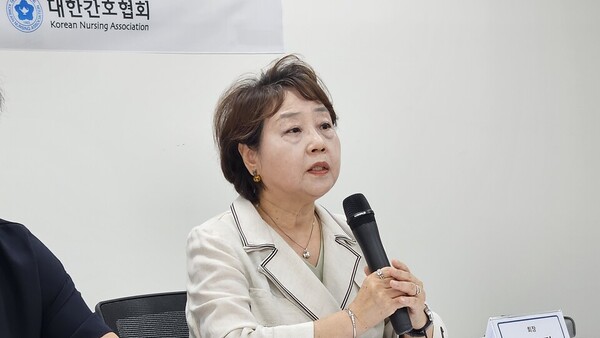The Korean Nursing Association (KNA) said Wednesday that nurses are doing “almost everything” without a specific scope of work in hospitals and are not implementing the “pilot project on nurse work.”
It called for specifying physician assistants’ jobs and qualifications in the Nursing Act’s enforcement decree and issuing separate licenses for physician assistant (PA) nurses.

Appearing on an MBC Radio talk show, KNA President Tak Young-ran pointed out that the actual tasks performed by PA nurses in the medical field are broader than the scope specified in the pilot program.
“Through the pilot project, we investigated the tasks that specialized nurses, skilled nurses who can perform difficult tasks (tentatively called ‘dedicated nurses’), and general nurses can perform, and we specified 88 tasks that nurses can perform,” Tak said.
Tak explained that while KNA specified 88 tasks for the pilot project, it also created a system to expand the scope of tasks if necessary. However, in hospitals not participating in the pilot project, (nurses) can be considered to be “doing everything,” she said.
“Through the enforcement decree of the Nursing Act, we need to establish a specific scope of work and standards for nurses to perform appropriate tasks based on their competencies,” Tak added.
She also suggested that PAs should be required to obtain a separate license, which allows them to perform a broader range of tasks than general nurses.
“Currently, among the skilled nurses specified in the Medical Service Act, there are PAs with master's degrees and those who received education and training,” Tak said. “There should be a system for Pas for whom a separate certification should be issued.”
“The evidence is already in place, including studies that show that (nurses) having certain qualifications in a certain field is very close to health outcomes and patient safety,” she said. “Qualifications are a critical barometer in foreign countries.”
Tak noted that the association is also closely communicating with the Ministry of Health and Welfare to develop a draft of the Nursing Act's enforcement decree.
“We are also working closely with the Ministry of Health and Welfare on the pilot project. We are preparing various things related to the enforcement decree of the Nursing Act. We are also conducting a mid-term evaluation of the pilot project,” she said. “We are listening to the voices of the field and communicating closely with the Ministry of Health and Welfare.”
Tak commented on the emergency medical crisis, “Nurses are working to normalize the emergency room. The shortage of doctors has long been a problem. Recently, it has become more severe. However, nurses are working hard to fill the void.”
Related articles
- Parliament’s passage of nursing law triggers fierce backlash
- Korea’s healthcare system is on edge of precipice amid resurging Covid-19
- Korea boosts 2025 healthcare budget by 7.4%, with focus on funding junior doctors, essential care
- Physicians call for ‘compensating costs’ to avoid deficit
- Lawmakers praise nurses for filling medical gap, promise best support
- Korean Nursing Association chief wins Florence Nightingale Medal

